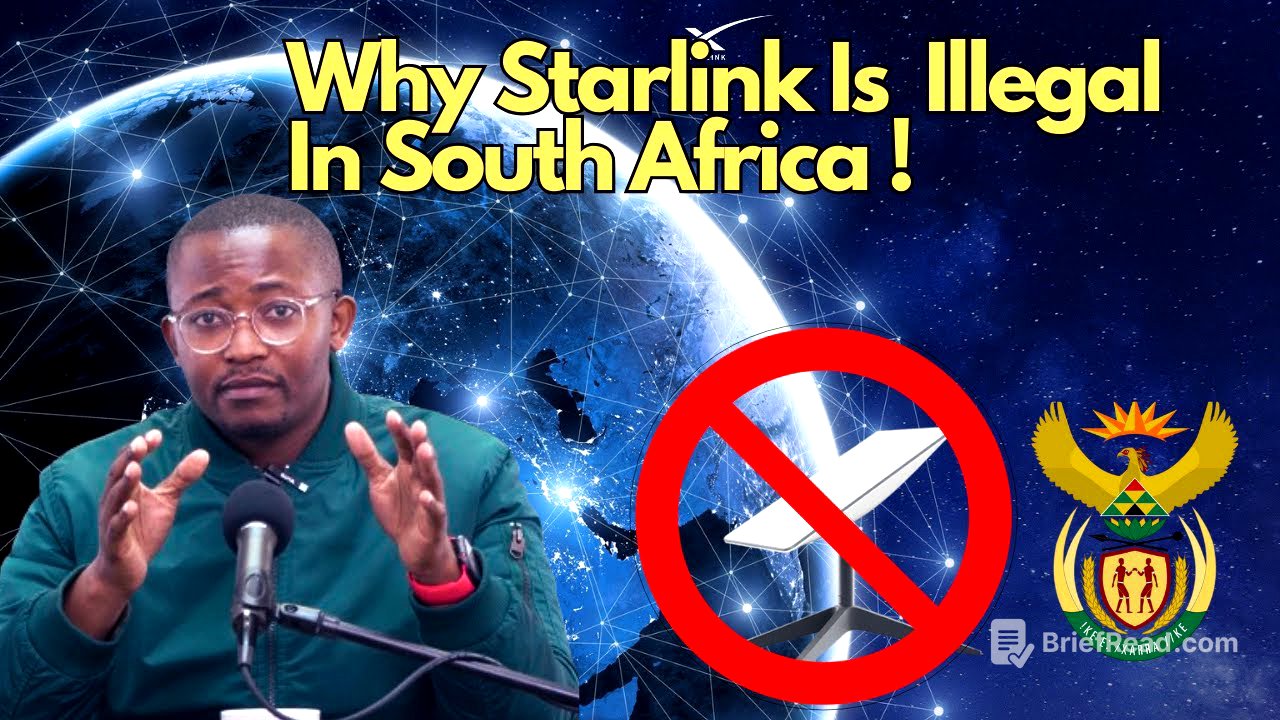TLDR;
This video discusses the reasons behind Starlink's unavailability in South Africa, despite its presence in other African countries like Zimbabwe. It highlights regulatory hurdles, including licensing and BEE compliance, as well as concerns about affordability, data security, and the protection of existing telecommunications infrastructure. The video also touches on the potential benefits of Starlink for rural communities and the need for Starlink to adhere to South African laws and contribute to the country's development goals.
- Starlink is not yet available in South Africa due to regulatory hurdles and concerns about affordability and data security.
- The South African government is taking a cautious approach to Starlink's entry to ensure fair competition and protect consumers.
- Starlink needs to adhere to South African laws and contribute to the country's development goals to operate in the market.
Starlink's Expansion in Africa [0:00]
The video begins by noting that while Elon Musk's Starlink has revolutionized internet access in many parts of the world, it is not yet available in South Africa. Zimbabwe recently became the eighth African country to license Starlink, partnering with a local company, IMC Communications, owned by Wicknell Chivayo, who has close ties to the president. Starlink will only be accessible through this company, which received licensing rights from the postal telecommunications regulatory authority of Zimbabwe. This highlights the importance of local partnerships for Starlink's operations in Africa.
What is Starlink? [1:15]
Starlink is a constellation of thousands of low earth orbit satellites, which are closer to Earth than traditional satellites. This proximity results in faster speeds, lower latency, and wider coverage. Starlink offers significantly faster download and upload speeds, potentially reaching over 100 megabits per second, and lower latency, which allows for smoother video conferencing, online gaming, and real-time applications. The extensive network of satellites promises broader internet access, reaching remote areas often underserved by traditional infrastructure.
Regulatory Hurdles in South Africa [2:17]
The most significant hurdle for Starlink in South Africa is the lack of an operating license from the Independent Communications Authority of South Africa (ICASA). ICASA requires all companies offering satellite internet services to acquire a license. While Starlink has expressed interest in entering the South African market, it has not formally applied for a license as of June 2024. ICASA has cautioned against importing and selling Starlink user terminals, calling it illegal. Starlink claims to be abiding by international regulations and accuses South African resellers of violating its terms of service and copyrights.
B-BBEE Compliance [4:01]
Broad-Based Black Economic Empowerment (B-BBEE) is a policy that all companies operating in South Africa must adhere to. This policy aims to redress historical economic inequalities by requiring companies to have a certain percentage of ownership or management positions held by black individuals, generally around 30%. While the exact details of Starlink's potential non-compliance with B-BBEE remain unclear, it has been cited as a reason for the delay in obtaining the license. Compliance demonstrates a commitment to inclusivity and aligns with South Africa's national development goals.
Cost Considerations [5:19]
The Starlink user terminal kit, including the dish and router, costs around $600 or 10,500 Rand. Subscription fees range from $100 to $500 (1,700 Rand to almost 8,700 Rand), depending on the data plans. These costs might seem excessive for urban areas with established fiber optic and cable internet options. However, for remote communities with limited or no internet access, Starlink could be a game-changer, but the high price is a significant barrier.
Potential Benefits for Rural South Africa [6:10]
Starlink could bridge the digital divide by connecting previously isolated communities and enabling access to education, healthcare resources, and economic opportunities. It can also empower rural businesses through reliable internet, opening doors for e-commerce, remote work opportunities, and improved communication. However, the affordability factor presents a significant challenge, as the upfront cost of the user terminals and ongoing subscription fees could be prohibitive for many low-income households in rural areas.
Protecting the Local Telecommunications Industry [7:16]
South Africa has the right to protect its industry, and ICASA has a responsibility to ensure a fair and competitive telecommunications landscape. Existing providers like Vodacom, MTN, and fiber network operators have invested heavily in infrastructure and adhered to local laws and taxes. A sudden unregulated entry by Starlink could disrupt the market, potentially leading to job losses and instability. ICASA needs to ensure that Starlink operates within established regulations, safeguarding consumer rights and adhering to quality of service standards.
Data Prices and Inequality [9:52]
Data prices charged by local telecoms companies are high. In neighboring Zambia, a gig of data is sold for just $13, while in South Africa, it costs almost double, around $26. The World Bank ranked South Africa as the world's most financially unequal country in 2022, and this inequality is evident in internet access. 7.5 million low-income South Africans are paying 80 times more than middle and upper-class citizens to browse the internet. Bringing in an even pricier alternative like Starlink may not be the solution.
Data Security and Residency Laws [11:42]
South Africa has established data residency laws that mandate certain types of data generated within the country, particularly personal information and sensitive financial data, must be stored on servers physically located in the country. These regulations protect citizen privacy and offer greater control and recourse in case of data breaches. Starlink's current model raises concerns regarding data residency, as data transmitted through Starlink satellites might be routed through servers outside of South Africa, potentially violating residency laws and exposing information to foreign entities.
Conclusion [13:52]
Starlink's absence from South Africa is a missed opportunity for some, but addressing regulatory hurdles, navigating potential competition concerns, and focusing on mutual benefits can unlock Starlink's potential to bridge the digital divide. Starlink needs to adhere to South African laws and contribute to the country's development goals. The South African government has taken a cautious approach to Starlink's entry, reflecting a commitment to the responsible development of the telecoms industry. Ensuring fair competition, protecting consumers, and addressing affordability concerns are crucial.









